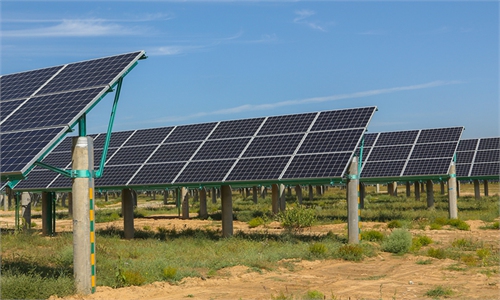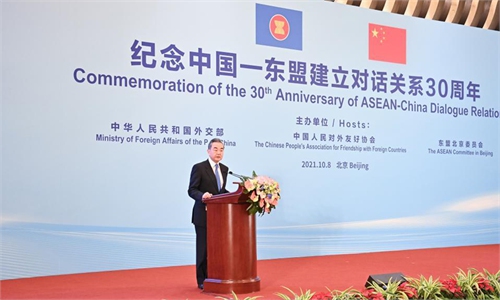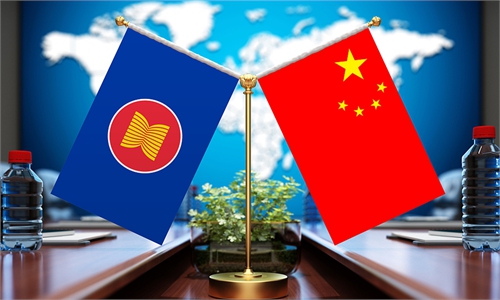China-ASEAN ties upgrade ‘to have global significance’; S.China Sea issue will be handled peacefully: experts
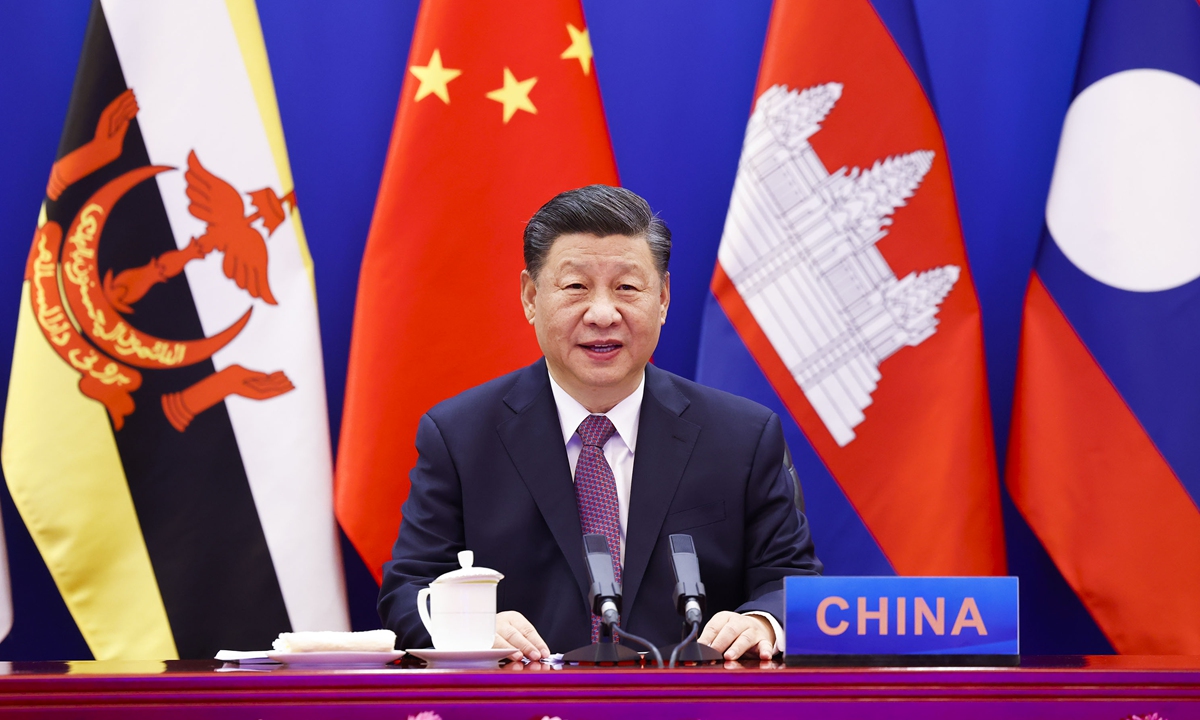
Chinese President Xi Jinping chairs the Special Summit to Commemorate the 30th Anniversary of China-ASEAN Dialogue Relations via video link on November 22, 2021 in Beijing. Photo: Xinhua
China and the Association of Southeast Asian Nations (ASEAN) decided on Monday to establish a comprehensive strategic partnership, a new milestone in the relations between the two sides that will inject fresh impetus into regional and world peace, stability and development.
Chinese President Xi Jinping made the announcement while chairing the Special Summit to Commemorate the 30th Anniversary of China-ASEAN Dialogue Relations via video link on Monday morning.
Chinese analysts said the comprehensive strategic partnership means a higher-level cooperation which will have global significance, and it also means that China will further share its development profits with and open its market to the ASEAN partners, and China will have a better and more effective mechanism based on mutual trust to solve differences such as territorial disputes in the South China Sea with some specific ASEAN members.
This will minimize the negative impact on overall China-ASEAN ties and individual bilateral ties, and will prevent the interruption made by external forces who love to see tensions in the region, said experts.
After announcing the establishment of a China-ASEAN Comprehensive Strategic Partnership, Xi said "This is a new milestone in the history of our relations and will inject new impetus into peace, stability, prosperity and development in our region and the world."
Citing a Chinese proverb that "Distance tests a horse's strength, and time reveals a person's integrity," Xi said that China was, is, and will always be ASEAN's good neighbor, good friend, and good partner.
The Chinese president reaffirmed that China will unswervingly take ASEAN as a high priority in its neighborhood diplomacy, unswervingly support ASEAN unity and ASEAN community building, unswervingly support ASEAN centrality in the regional architecture, and unswervingly support ASEAN to play a bigger role in regional and international affairs.
We will implement in earnest our comprehensive strategic partnership, and make new strides toward building a closer China-ASEAN community with a shared future, Xi said.
Xu Liping, director of the Center for Southeast Asian Studies at the Chinese Academy of Social Sciences in Beijing, told the Global Times on Monday that "the China-ASEAN cooperation in the future will not be limited just to this region, but will have global significance."
This includes cooperation on clean energy, science and technology, as well as climate change, Xu said, noting that China will share its technologies and market with its ASEAN partners and deepen the existing cooperation, and the China-ASEAN Free Trade Area is expected to become a region with the best performance around the world in the future post-pandemic recovery.
Peace and conflict prevention
Xi made five proposals on the development of future relations between China and ASEAN at the summit, which are to build a peaceful home together, build a safe and secure home together, build a prosperous home together, build a beautiful home together, and build an amicable home together.
Peace is our greatest common interest and the greatest common aspiration of people in all countries, Xi said. We need to serve as the builders and guardians of peace in the region. We need to pursue dialogue instead of confrontation, to build partnerships instead of alliances. China firmly opposes hegemony and power politics. China will never seek hegemony, still less bully smaller countries, he noted.
Chinese experts said this is a promise to not only ASEAN but also the world that although China is a major power with significant strength, China doesn't believe in hegemony and power politics because this is not sustainable, is costly and will harm a country's own development. So unlike the US or other major powers, China won't use its power to deal with small countries from a position of strength.
China supports ASEAN's efforts to build a nuclear weapons-free zone, and is prepared to sign the Protocol to the Treaty on the Southeast Asia Nuclear Weapon-Free Zone as early as possible, Xi said.
Li Haidong, a professor at the Institute of International Relations of the China Foreign Affairs University, told the Global Times on Monday that "stressing support for the nuclear weapons-free zone targets the irresponsible behavior of nuclear proliferation made by the US-led AUKUS alliance."
AFP reported that Australia formally embarked Monday on a hotly contested program to equip its navy with nuclear-powered submarines in a new defense alliance with the US and the UK. Such an attempt has already concerned ASEAN members such as Malaysia.
Malaysian Prime Minister Ismail Sabri Yaakob expressed his concern in October that the AUKUS' act could "lead to an arms race and spark tensions, which could lead to instability in the region, particularly in the South China Sea," Malaysian newspaper The Star reported in October.
To prevent the nuclear proliferation and an arms race in the region, China and the ASEAN share a common interest, and are motivated to cooperate to prevent any external force from creating the risk of nuclear proliferation and conflicts, and China and ASEAN are capable of safeguarding peace in the region, Li noted.
South China Sea
The South China Sea is a sensitive topic that could still spark frictions between regional countries, and this requires China and the ASEAN to work together in building a more effective mechanism based on mutual trust and to prevent any external interruptions, said experts.
Reuters reported that at the summit on Monday, Philippine President Rodrigo Duterte expressed his concern over recent frictions with China in the South China Sea, and said the rule of law was the only way out of problems.
Xu said through the bilateral channel, the involved parties are able to solve the problem properly. The key is for involved parties to build a mature and effective mechanism to prevent miscalculation and misunderstanding, the expert said.
"External forces like the US love to see such frictions because this could interrupt the existing cooperation between China and the Philippines," and China needs strategic patience and calm to better handle this issue to minimize the negative impact, Xu noted.
Regional countries need to stay alert and decide which is much more important, to have mutually beneficial pragmatic cooperation or to be used by an external power to have confrontation with China on the sovereignty issue, Xu said.
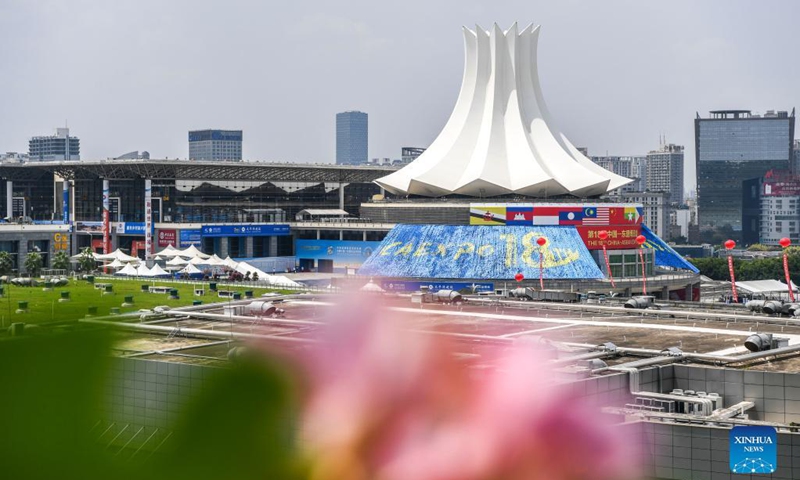
Photo taken on Sept. 10, 2021 shows a view of the Nanning International Convention and Exhibition Center, the venue of the 18th China-ASEAN Expo and China-ASEAN Business and Investment Summit, in Nanning, capital of south China's Guangxi Zhuang Autonomous Region. The 18th China-ASEAN Expo and China-ASEAN Business and Investment Summit kicked off on Sep 10, in Nanning, highlighting the building of a closer China-ASEAN community with a shared future. Photo: Xinhua
Comprehensive cooperationThe mainstream of China-ASEAN relations will always be cooperation and friendship, not conflict and dispute, said Chinese analysts. They stressed that the speech delivered by Xi mentioned many fields where China is able to provide meaningful support in terms of finance or technologies, and external forces who want to interrupt regional integration, like the US, will never have the ability and motivation to provide these resources to boost regional cooperation and integration.
China is ready to work with the ASEAN members to jointly build a "health shield" for the region. China is ready to donate an additional 150 million doses of COVID vaccines to ASEAN members to support higher vaccination rates in countries in the region, Xi said.
China will contribute an additional $5 million to the COVID-19 ASEAN Response Fund, step up vaccine joint production and technology transfer, and collaborate on the R&D of essential medicines to help ASEAN increase its self-reliance, Xi said.
China is ready to provide ASEAN with another $1.5 billion in development assistance in the next three years to support ASEAN members' fight against COVID-19 and their economic recovery, Xi said.
China will launch the China-ASEAN Science, Technology and Innovation Enhancing Program, and will provide 1,000 items of advanced and applicable technology to ASEAN and support a program for 300 young scientists from ASEAN to come to China for exchanges in the next five years, Xi said.


